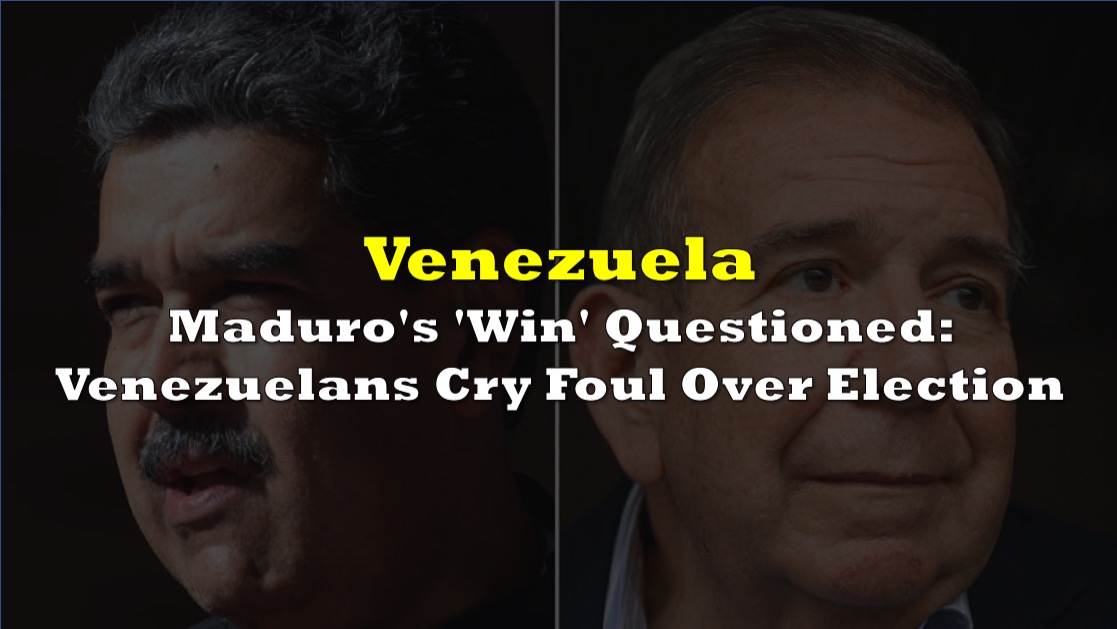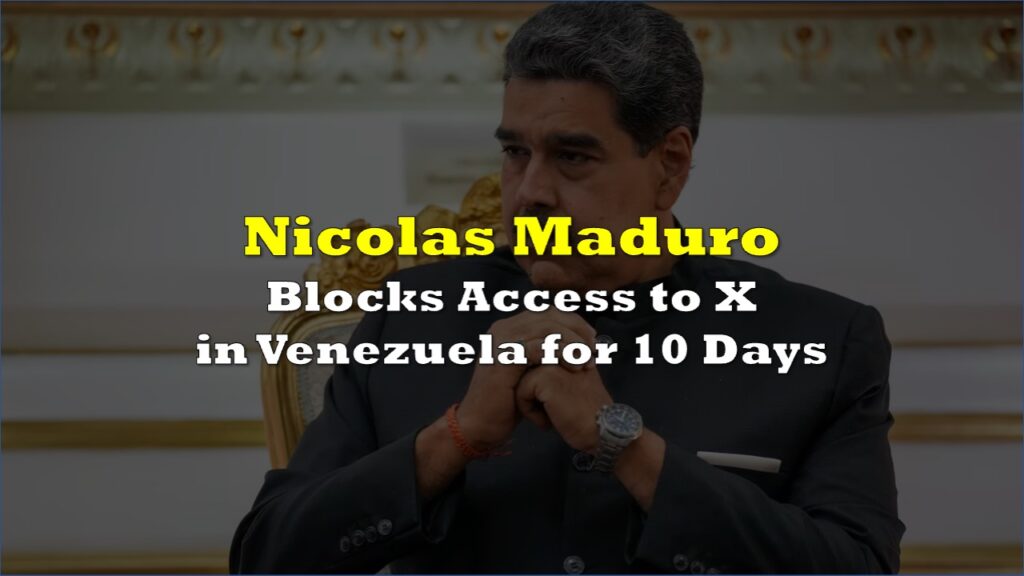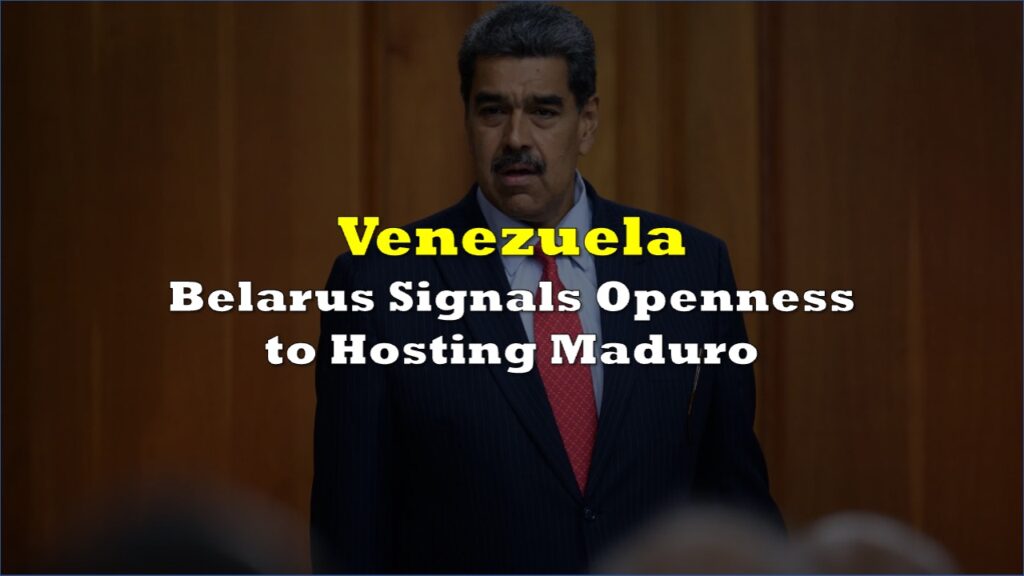In a highly contentious and disputed election, Venezuela’s National Electoral Council (CNE) declared incumbent President Nicolás Maduro the winner with 51.2% of the vote. His main opponent, Edmundo González, reportedly garnered 44.2%. However, these results have been fiercely contested by the opposition and have sparked widespread outrage and skepticism both domestically and internationally.
BREAKING: Venezuela's National Electoral Council claims Nicolás Maduro received majority of votes in presidential election
— BNO News (@BNONews) July 29, 2024
The Venezuela Electoral Commission is now claiming, with 80% of the Votes in, that Nicolás Maduro has Won a Third Term as President, despite all Early Polls having Maduro way behind Opposition Candidate Edmundo González. The Commission claims that Maduro had Secured 51.2% of the…
— OSINTdefender (@sentdefender) July 29, 2024
Bro just straight up fuckin lied…
— All Source News (@All_Source_News) July 29, 2024
Maduro getting 51% of the vote is absolutely comical. https://t.co/6ozT2tQcVR
Reports of irregularities
The opposition has rejected the official results outright. María Corina Machado, a leading opposition figure, declared, “We won and the whole world knows it,” alleging that their records showed González winning with 70% of the vote against Maduro’s 30%.
González himself also claimed that rules were violated during the election process. “The entire international community knows what happened in Venezuela and how people voted for change,” Machado stated. She emphasized that the opposition would “defend the truth” and continue their struggle against what they see as a fraudulent election.
BREAKING:
— Visegrád 24 (@visegrad24) July 29, 2024
The unofficial election results from Venezuela, presented by the opposition, are in.
Major loss for Maduro and his communist allies#VenezuelaLibre 🇻🇪 pic.twitter.com/nvBWGZfIlO
Since they can’t trust the National Electoral Council (CNE), many polling stations are publicly announcing the election result in their polling station.
— Visegrád 24 (@visegrad24) July 29, 2024
Here is an example:
Nicolás Maduro: 158 votes
Edmundo González: 966 votes #VenezuelaLibre 🇻🇪 pic.twitter.com/UX46unik2s
Vote authentication is currently ongoing at many polling stations across Venezuela, some preliminary counts so far show the opposition with a significant margin over maduro.#Venezuela https://t.co/LIXRp9vRvu
— CNW (@ConflictsW) July 28, 2024
Numerous reports of irregularities and voter intimidation have emerged. According to OSINTdefender, “Thing could be on the verge of boiling over in Venezuela; with Presidential Election Results so far showing that Opposition Candidate, Edmundo González has won by a landslide against Nicolás Maduro… despite a ‘Sea of Reports’ about Election Intimidation by Members of the Maduro Party against Voters.”
There were also accounts of Venezuelans abroad allegedly being refused entry into the country, thus being unable to vote.
Thing could be on the Verge of Boiling Over in Venezuela; with Presidential Election Results so far showing that Opposition Candidate, Edmundo González has Won by a Landslide against Nicolás Maduro, who was been President of Venezuela since 2013. This is despite a “Sea of… pic.twitter.com/WLL5Qwkhff
— OSINTdefender (@sentdefender) July 29, 2024
The Venezuelan border with Brazil is blocked by the Venezuelan military and closed, the Venezuelan border with Colombia in Cúcuta/Tachira is also closed despite announcements it would stay open throughout the election this weekend.#Venezuela pic.twitter.com/YR4HiBpS6b
— CNW (@ConflictsW) July 26, 2024
Al Cardenas noted, “Maduro is losing big-but here comes the violence and the intimidation. The next few hours are critical if the true election results were scrutinized, opposition wins but Maduro’s military may violate the clear will of the people and need to be subdued-but international help may well be needed.”
Additionally, Visegrád 24 reported, “Young Venezuelan man killed as Maduro’s police and armed communist gangs launch an attack on voters in Táchira.”
Maduro is losing big-but here comes the violence and the intimidation. The next few hrs are critical if the true election results were scrutinized, opposition wins but Maduro’s military may violate the clear will of the people and need to be subdued-but international help may… https://t.co/qjAhB4jcEZ
— Al Cardenas (@AlCardenasFL_DC) July 29, 2024
BREAKING:
— Visegrád 24 (@visegrad24) July 29, 2024
Young Venezuelan man killed as Maduro’s police and armed communist gangs launch an attack on voters in Táchira.#VenezuelaLibre 🇻🇪 pic.twitter.com/o3IdQGb6ko
At the Andrés Bello school polling station in Caracas, men in unmarked black jackets temporarily blocked access, resulting in a physical altercation where a woman was punched. In Maturín, a woman was reportedly hit by a bullet during a drive-by shooting by men on motorcycles near a voting line.
Election day was marked by widespread reports of irregularities and voter suppression. Many polling stations opened late, and there were numerous instances of malfunctioning voting machines. In Maracaibo, voters found their polling places had been moved without prior notice.
Sonia Gómez, 65, recounted how she had checked the CNE website for her polling station only to find it had been changed upon her arrival on election day. “They moved us older people because they know we don’t have that much energy,” she said, “but I’m going to look for someone to take me to vote.”
The atmosphere in Caracas reflected the nation’s deep divisions. Maduro supporters celebrated outside the presidential palace, while opposition supporters were seen crying and hugging on the streets. In Petare, a large favela in Caracas, crowds celebrated what they believed to be an opposition victory, highlighting the community’s shifting political landscape.
BREAKING:
— Visegrád 24 (@visegrad24) July 29, 2024
Venezuelans take to the streets in Petare in Caracas to celebrate Maduro losing the election
Petare is the largest favela, not just in Venezuela, but in all of South America
It was a major Chavez & Maduro stronghold, but clearly not anymore 🇻🇪 pic.twitter.com/AVh80aj6CU
International reactions
The international community has expressed significant concerns regarding the election’s integrity. U.S. Secretary of State Antony Blinken voiced “serious concerns that the result announced does not reflect the will or the votes of the Venezuelan people.” He called for a transparent and fair vote count and urged the CNE to release detailed vote tabulations.
Ricardo Hausmann, professor at Harvard’s Kennedy School and a Venezuelan, posted on X, “On the Venezuelan elections: two obvious facts. First, the opposition won by a landslide of over 30% points difference. Second, the government has decided to steal the result.”
On the Venezuelan elections: two obvious facts. First, the opposition won by a landslide of over 30% points difference. Second, the government has decided to steal the result.
— Ricardo Hausmann (@ricardo_hausman) July 29, 2024
Several Latin American leaders, including the presidents of Peru, Chile, Argentina, and Costa Rica, have either denounced or cast doubt on the results, with some stating they would not recognize Maduro’s victory. Meanwhile, Maduro’s allies, including the presidents of Bolivia, Honduras, and Cuba, have congratulated him on his win.
A delegation from the Spanish political party Partido Popular was reportedly denied entry into Venezuela and faced deportation. Additionally, five former presidents from Costa Rica, Bolivia, Mexico, Panama, and the former vice president of Colombia, who had planned to serve as election observers, were allegedly stranded in Panama, awaiting permission to travel to Caracas.
BREAKING: Right now in Panama, 5 ex-Presidents of Costa Rica, Bolivia, Mexico, Panama and the former VP of Colombia who had planned to travel to Venezuela as election observers had get off the plane. They each gave a speech (in thread)-Airline says we are awaiting again…
— Lilia Luciano (@lilialuciano) July 26, 2024
The United States and other nations have imposed severe sanctions on Maduro’s regime, hoping to pressure the government into democratic reforms. These sanctions have further crippled Venezuela’s economy, which Maduro blames for the country’s financial woes. Critics argue that Maduro’s mismanagement and corruption are the primary causes of the economic collapse.
This election marks a critical juncture for Venezuela, a nation that has suffered severe economic hardship and political instability under Maduro’s rule. Since taking office in 2013 following Hugo Chávez’s death, Maduro has overseen an unprecedented economic collapse, resulting in one of the largest migrant crises in the world. The opposition, galvanized by widespread dissatisfaction, had hoped to restore democracy and rebuild the economy.
Maduro’s administration has long been accused of manipulating electoral outcomes to maintain power. The government’s control over public institutions, including the Supreme Court and the CNE, has raised serious concerns about the fairness of the election process. Allegations of vote-rigging and suppression of opposition activities are not new in Venezuela but were particularly prominent in this election cycle.
If Maduro’s victory is upheld, it will extend the rule of Chavismo, the socialist-inspired movement founded by Hugo Chávez, into its third decade. Chávez’s promise to lift millions out of poverty initially found success but has since given way to economic ruin and widespread suffering.
For many Venezuelans, the hope for a better future lies in political change. The opposition, led by figures like María Corina Machado and Edmundo González, has vowed to continue their fight for democracy and justice.
Information for this briefing was found via CNN, The New York Times, and the sources mentioned. The author has no securities or affiliations related to this organization. Not a recommendation to buy or sell. Always do additional research and consult a professional before purchasing a security. The author holds no licenses.









